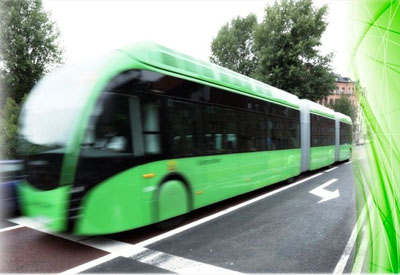City of Brampton approves the Purchase of 10 Electric Buses

September 27, 2017
Brampton City Council has given the city’s transit authority the green light to purchase up to 10 battery-electric buses and four high-powered overhead electric charging stations as part of a multimillion dollar trial run aimed at lowering carbon emissions and fuel costs.
The $13.6 million capital project is part of the Pan-Ontario Electric Bus Demonstration and Integration Trial, “a unique partnership model” made up of multiple levels of government, bus manufacturers and other stakeholders, including the Canadian Urban Transit Research and Innovation Consortium (CUTRIC). Automation firms ABB and Siemens will build the charging stations.
The new 100 per cent battery electric buses will be launched on two existing conventional routes in Brampton, routes 23 Sandalwood and 26 Mount Pleasant, with new overhead charging stations at the Mount Pleasant Village terminal, the Queen Street/ Highway 50 Züm station, and the Sandalwood Transit Facility.
New Flyer Industries and NOVA Bus will supply the buses, which could hit Brampton’s streets as early as spring 2018. Other levels of government are expected to offset some of the costs, according to a staff report.
“As a fast-growing Canadian city undergoing major urban intensification, Brampton’s public transit users expect and deserve leading-edge technology and superior services,” said Mayor Linda Jeffrey, stressing a need for transit solutions that are “environmentally friendly and help move our people more efficiently.”
Josipa Petrunic, CUTRIC executive director and CEO, said the pilot effort will show “the world Canada is a leader in driving down emissions, improving transportation, and creating greener, cleaner and more mobile communities.”
Brampton Transit currently operates a fleet of 407 buses, including conventional diesel and 99 diesel-electric hybrid Züm buses.
Transit staff said the electric bus trial would allow the city to compare efficiencies, maintenance costs “and validate electric vehicle technology as a viable alternative fuel source”.
Brampton Transit spent $10.8 million on diesel fuel last year. Under the Province’s new cap-and-trade system, fuel costs in 2017 are expected to increase by an estimated $570,000 annually (anticipated carbon pricing will increase diesel fuel cost by an estimated four to five per cent).
Another benefit is reduced maintenance cost. Maintenance on electric buses is estimated to be 50 per cent less than conventional diesel buses, said staff.
Electric buses take approximately three to five minutes to fully charge using smart-grid technology.
Staff will report back to council with an update on the status of the trial following the conclusion of Phase 1.
https://www.bramptonguardian.com/news-story/7185321-electric-buses-to-hit-brampton-roads-by-2018/











![Guide to the Canadian Electrical Code, Part 1[i], 26th Edition– A Road Map: Section 56](https://electricalindustry.ca/wp-content/uploads/2022/11/Guide-CE-Code-2.png)



